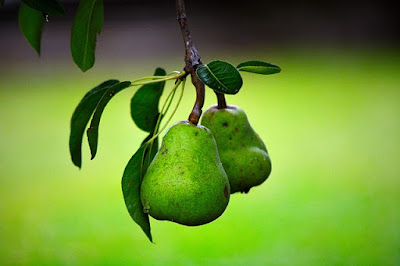Forbidden fruit was just the beginning
 |
| Because apples get a bum rap |
I had some thoughts over the weekend, and I wanted to get them down before I forgot. I've been pondering the Fall and the forbidden fruit. In Genesis 2-3, the forbidden fruit looms almost as large as the serpent, but I suspect it's mostly because of two things: The threat of death, and we know how the story ends. I suspect that leads us (creationists? other theologians?) to telescope in on the fruit and the consequences, as if that was all that was going on. As I ponder this, I'm also thinking about some modern theistic evolution readings of the Fall, where the entire account is rendered a kind of fable for the common human experience of yielding to temptation. After all, what kind of father curses the entire human race to death because someone ate the wrong piece of fruit?
And that's where I think it's tragically misguided, because by focusing solely on the fruit, we're ignoring the context of God's instructions. God did not create the universe and place humans on this planet merely to avoid eating a piece of fruit. God gives humanity several tasks in the creation account, and those tasks are all, I believe, linked to reflecting the image of God. Humanity must exercise dominion, which is elaborated as caring and guarding creation. Humanity must be fruitful and multiply, because we cannot reflect the image of God alone. And as we look forward in the scripture, we can reasonably surmise there would be other things that would be expected of us, like not murdering people (I'm looking at you, Cain). So the fruit was not the only thing forbidden and certainly not the only way Adam and Eve could have sinned.
Why bother with the fruit though? Why make one tree arbitrarily forbidden? There must be a larger purpose here, one that is sensible in the larger tasks given to humanity and the other expectations placed on them. The account of the creation of Eve is an exercise of dominion as the image of God, where Adam sees that the creation is incomplete and names creatures, just as God did in Genesis 1. Could this prohibited fruit serve a similar purpose? Is it an exercise of proper dominion? One exercise is a positive activity (naming animals and recognizing the incompleteness of creation), and the other is a negative prohibition (there are some things that you may not do).
If so, that raises an additional question: If the fruit prohibition is an exercise, were there other things that might have been prohibited to unfallen humanity in their exercise of dominion? Now that question certainly deserves an affirmative answer. Wanton destruction of creation for selfish purposes couldn't possibly be part of the exercise of dominion. Even more, if there was genuine immortality before the Fall (whether or not it was conditional on the tree of life), there would certainly be some biological knowledge that would be out of reach without death. Indeed, as I like to point out to my students, biology may be a discipline that studies life, but we often do it by killing things. Even the modern cell biology revolution was largely made possible by HeLa cells, which were harvested from an aggressive tumor that killed a woman.
Could the forbidden fruit be just the beginning of many things that God would prohibit to humanity in the unfallen world? So the failure in the garden was not merely violating one random law of God: It was a failure to act in true dominion over the earth. They listened to a wily serpent rather than to God. They succumbed to their own desires and poor judgment rather than obeying the word of God. All of these things are wrapped up not in biting a fruit but in failing to exercise dominion - one of the central tasks of humanity - to show the image of God. One who is faithful in a very little is also faithful in much, and one who is dishonest in a very little is also dishonest in much. We blew it right at the very beginning.
Could it be that death came to creation not merely because Eve ate some fruit or Adam disobeyed God's command but because humanity collectively failed in the much greater and more central task of reflecting God's image in our dominion over creation? That's a much graver sin indeed.
Feedback? Email me at toddcharleswood [at] gmail [dot] com. If you enjoyed this article, please consider a contribution to Core Academy of Science. Thank you.
Have you read my book? You should check that out too!
